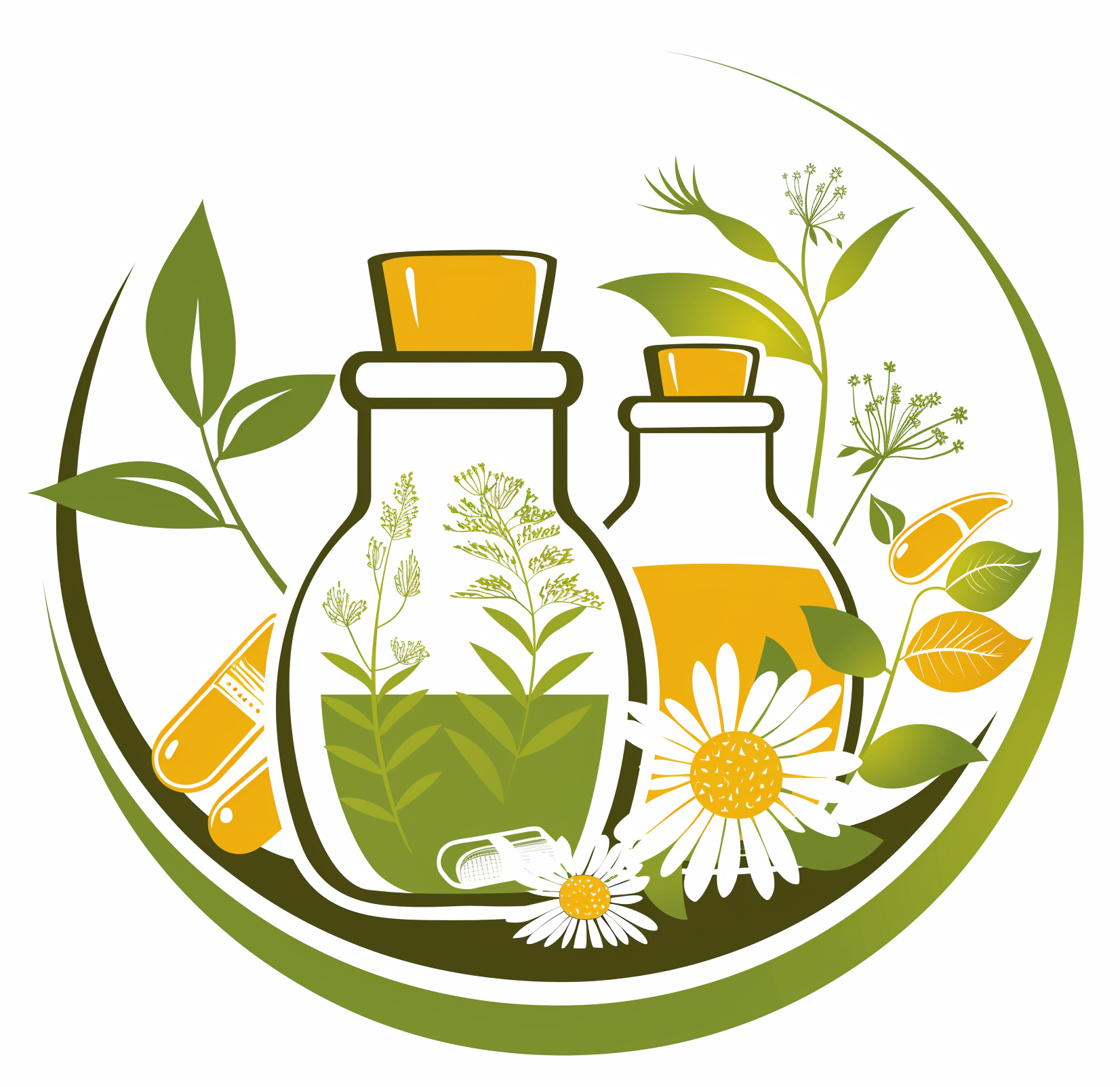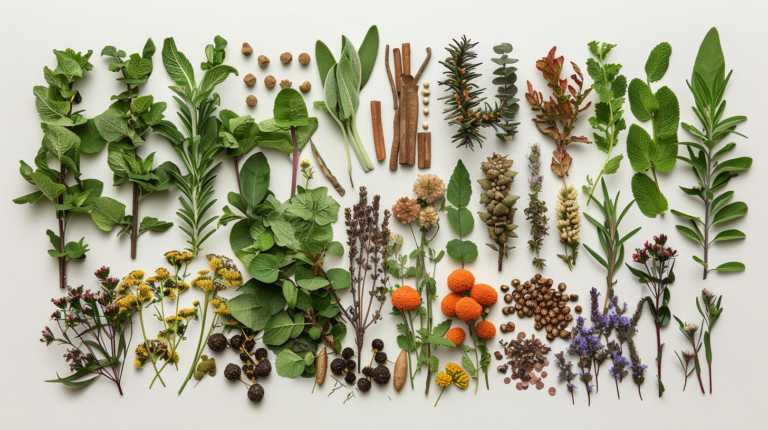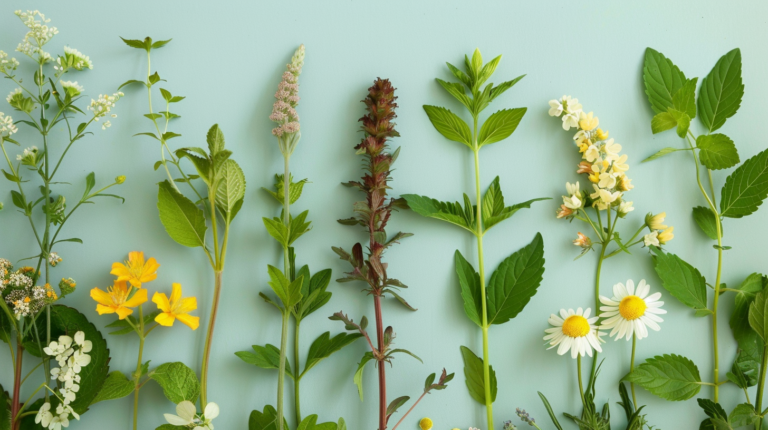Top Benefits of Herbal Medicine for a Healthier Life
Have you ever felt disheartened by the seemingly never-ending list of side effects from conventional medicines? Or maybe you’re searching for a more natural approach to support your overall health? Modern-day medicine, as miraculous as it can be, often leaves us grappling with unwanted effects. Imagine if there was a way to harness the power of nature to alleviate your ailments—without breaking the bank or bombarding your body with chemicals.
Enter the world of herbal medicine. This age-old practice offers a treasure trove of herbal supplements and remedies that can serve as the perfect antidote to modern woes. From boosting immunity with Echinacea to alleviating stress with lavender, the benefits of herbal medicine are vast and varied. Let’s explore how these potent plants can transform your holistic approach to health, offering an alternative path to wellness that aligns perfectly with your body’s natural rhythms.
What is Herbal Medicine?
Definition and History
Herbal medicine, also known as herbal remedies or botanical medicine, is the use of plants for medicinal purposes. This ancient practice dates back to the dawn of human history and spans various cultures. From the European medieval apothecaries dabbling in traditional medicine to the rich tapestry of Chinese herbal medicine, the wisdom of plants has long been recognized. The World Health Organization (WHO) even acknowledges the relevance of traditional herbal treatments globally.
In ancient cultures, plants were our first pharmaceuticals. In China, herbs like ginseng and licorice have been used for over 5,000 years. Greek and Roman physicians, such as Hippocrates and Galen, utilized herbs extensively. Throughout history, the medicinal knowledge of plants was passed down through generations, blending folklore with empirical studies.
Modern-Day Use
Although we live in an age dominated by synthetic drugs and clinical treatments, the use of herbal medicines persists. Interestingly, in the United States, there’s been a renaissance of sorts, with people increasingly seeking out alternative medicine and complementary therapies to enhance their well-being.
Today, herbal medicine is a harmonious blend of tradition and modern science. Research on PubMed reveals an increasing number of studies validating the effectiveness of herbs. For instance, echinacea is now scientifically recognized for its immune-boosting properties, and turmeric is studied for its anti-inflammatory benefits. The National Center for Complementary and Integrative Health (NCCIH) actively conducts and supports such study, ensuring a balance between traditional wisdom and contemporary validation.
7 Health Benefits of Herbal Medicine
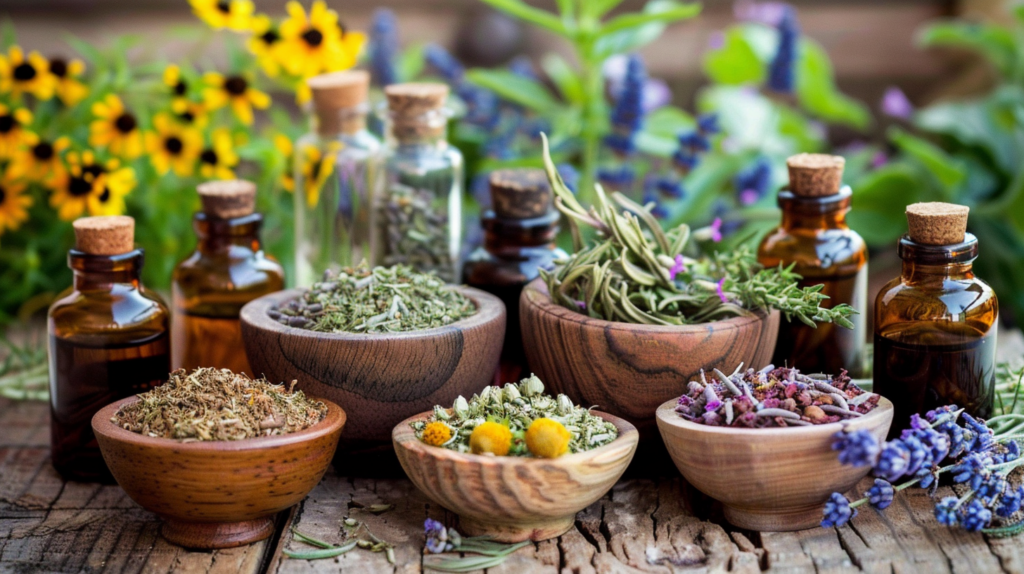
1. Boosting the Immune System
1.1 Plant-Based Nutrients
Herbal medicines like Echinacea and Turmeric are powerhouses of nutrients that enhance the immune system. Echinacea, for example, is packed with polysaccharides, alkamides, and glycoproteins, all of which stimulate the immune cells and help fend off infections. Turmeric, a spice derived from the Curcuma longa plant, contains curcumin, known for its anti-inflammatory and antioxidant properties, which support immune function.
1.2 Supportive Compounds
Beyond the basic nutrients, herbs often have complex compounds that give them their unique medicinal properties. For instance, Garlic contains allicin, which has powerful antimicrobial and antioxidant properties, helping to ward off colds and infections. On the other hand, the thymol in Thyme not only delights the palate but also enhances immune response by supporting the thymus gland. Curious fact: I’ve personally found thyme tea to be a comforting remedy during flu season, right from my garden!
2. Cost-Effectiveness
2.1 Growing Your Own Herbs
One of the most practical benefits of herbal medicine is the ability to grow your own herbs. Imagine stepping into your backyard and plucking fresh mint or rosemary whenever you need it. Not only does this reduce the cost associated with regular trips to the pharmacy, but it also ensures that you have access to organic, untreated plants. I’ve been growing my herbal garden for years, and trust me, the satisfaction of brewing your own remedies is unparalleled.
2.2 Economical Preparations
Herbal remedies are surprisingly inexpensive. Basic preparations like teas, tinctures, and salves require minimal investment once you have a steady supply of herbs. For instance, making an immune-boosting elderberry syrup at home is often cheaper than buying pre-packaged supplements. Plus, the joy of crafting your own medicinal blends brings added emotional and mental health benefits.
3. Natural and Safe
3.1 Fewer Side Effects
Herbal medicines generally come with fewer side effects compared to conventional pharmaceuticals. Unlike many synthetic drugs, herbs work synergistically with the body. For example, while NSAIDs might cause stomach ulcers or liver damage with long-term use, herbs like chamomile and ginger provide similar anti-inflammatory benefits without the harsh side effects. However, it’s vital to use them judiciously. Always consult healthcare professionals if unsure.
3.2 Long History of Use
The use of herbs for medicinal purposes dates back millennia, with civilizations across the globe relying on plants for healing. Traditional Chinese Medicine (TCM), Ayurveda from India, and Native American healing practices all hold extensive records of herbal medicine use. This long history provides a rich repository of knowledge. For instance, TCM’s use of ginseng for vitality or the Ayurvedic use of Ashwagandha for stress relief illustrates the depth of wisdom in traditional practices.
4. Self-Reliance and Empowerment
4.1 Home Remedies
One of the wonderful things about herbal medicine is the empowerment it gives individuals. You can create effective home remedies with herbs from your garden. For instance, crafting a soothing salve for skin irritations from calendula flowers and lavender is simple and satisfying. There’s an unmatched joy in knowing that relief comes from your own hands. Just last month, I whipped up a batch of calendula-infused oil to treat a minor burn—it worked like a charm!
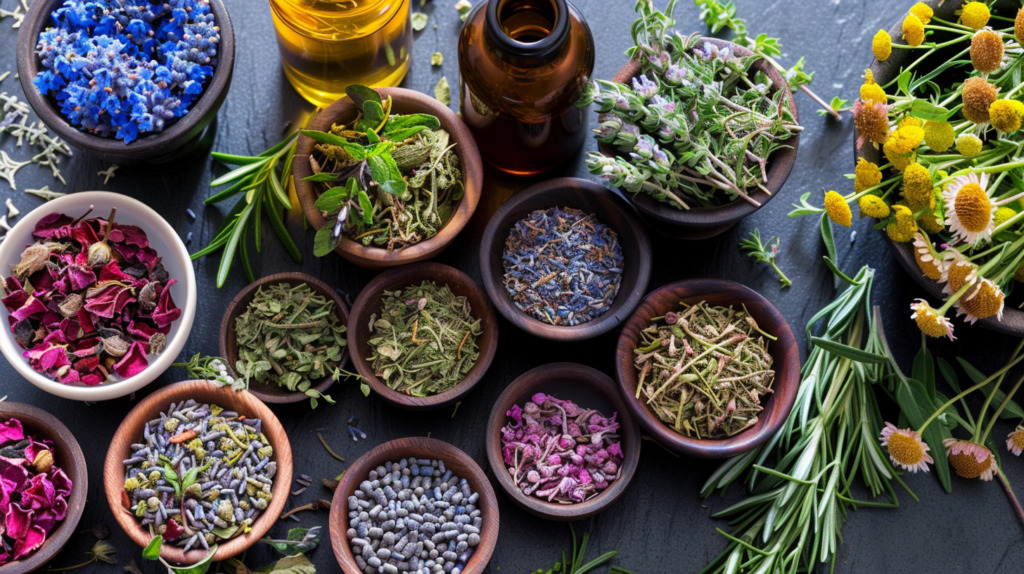
4.2 Knowledge and Skills Development
Delving into herbal medicines enriches your life with valuable skills. Learning to identify, grow, and prepare plants for treatment develops a deeper connection to nature. It’s not just about healing; it’s about becoming more self-reliant and equipped to care for your health naturally. Every time I teach someone how to brew a comforting chamomile tea, I’m passing along generations of wisdom.
5. Preventive Health Care
5.1 Daily Health Maintenance
Incorporating herbs into your daily routine can prevent illnesses before they start. Consuming herbal teas like green tea or nettle can boost your overall health. My morning routine includes a warm cup of nettle tea, which is packed with vitamins and minerals and supports my immune system. It’s like nature’s multivitamin!
5.2 Avoiding Chronic Illnesses
Regular use of herbal supplements can stave off chronic diseases. For example, turmeric is renowned for its anti-inflammatory properties, potentially reducing the risk of arthritis and heart disease. Scientific studies have backed these claims, making herbs a compelling part of a preventative health strategy.
6. Emotional and Mental Health
6.1 Stress Relief
Speaking of which, the role of herbs in managing stress can’t be overstated. Herbs like valerian and St. John’s Wort are excellent for promoting relaxation and reducing anxiety. I keep a tincture of valerian root in my cupboard—perfect for those sleepless nights when my mind just won’t shut off.
6.2 Mood Enhancement
Herbal treatments can significantly improve your mood. St. John’s Wort has been used for centuries to combat depression. Many studies show that it can be as effective as conventional antidepressants, without the side effects. Alternatively, sipping lemon balm tea can bring a gentle lift to your spirits.
7. Integrated Wellness
7.1 Balancing with Conventional Medicine
Integrative health merges herbal medicine with conventional methods, creating comprehensive care plans. This holistic approach ensures that you’re not just treating symptoms but enhancing your overall health. I always advocate for an integrated approach—using herbs alongside conventional treatments has provided balanced care for many of my friends and family.
7.2 Holistic Approach
Herbal medicine inherently takes a holistic view of health care. It promotes balance within the body and considers emotional and physical health. Herbalists often address underlying causes of illnesses rather than just symptoms. This approach is particularly valued in treating complex, chronic conditions like cancer or autoimmune diseases.
8 Plants with Specific Benefits for Health Conditions

Boosting Immunity
Echinacea
Let’s talk about a humble hero – echinacea. This purple coneflower has gained tremendous popularity for its immune-enhancing properties. Studies confirm that echinacea can boost the body’s natural resistance to infections by stimulating immune function. It’s particularly effective in warding off colds and respiratory infections when taken at the early signs of illness.
Garlic
Garlic isn’t just for warding off vampires; it’s a potent immune booster too. Rich in allicin, garlic has natural antibacterial and antiviral properties. Chewing on raw garlic might not make you the belle of the ball, but it will certainly strengthen your immunity and keep those pesky microbes at bay. Plus, it’s been shown to reduce the severity of flu symptoms.
Improving Digestion
Ginger
For centuries, ginger has been the go-to herb for digestive issues. Modern research corroborates this ancient knowledge, showing that ginger can help alleviate nausea and improve overall digestion. A ginger tea, with its warm, spicy zing, can be a lifesaver after a heavy meal or during pregnancy for morning sickness.
Peppermint
Peppermint is another digestive superstar. It’s known to relax the muscles of the gastrointestinal tract, aiding in the reduction of bloating and cramps. Sipping on peppermint tea can help soothe an upset stomach, and it’s a refreshing way to keep your digestive system in check.
Alleviating Stress and Anxiety
Lavender
Just a whiff of lavender can transport you to a place of calm and tranquility. Lavender is widely recognized for its anxiety-relieving properties. It acts on the nervous system to help reduce stress, improve sleep, and even alleviate symptoms of depression. Sprinkle a few drops of lavender essential oil on your pillow or enjoy a calming lavender tea for some instant peace.
Chamomile
Chamomile takes its place as one of the most beloved herbs for stress relief. Its mild sedative properties make it an excellent choice for calming the nerves and promoting relaxation. Chamomile tea before bed is a time-honored tradition for ensuring a good night’s sleep.
Pain Relief
Turmeric
Golden and glorious, turmeric is a powerhouse when it comes to reducing inflammation and relieving pain. Curcumin, the active compound in turmeric, has been extensively studied for its anti-inflammatory effects. Incorporating turmeric into your diet can help manage chronic pain conditions like arthritis.
Willow Bark
Before there was aspirin, there was willow bark. Known for centuries for its pain-relieving properties, willow bark contains salicin, which is chemically similar to aspirin. It’s effective for headaches, muscle pain, and even osteoarthritis – just remember to use it wisely, as it can act as a blood thinner.
Safety and Precautions
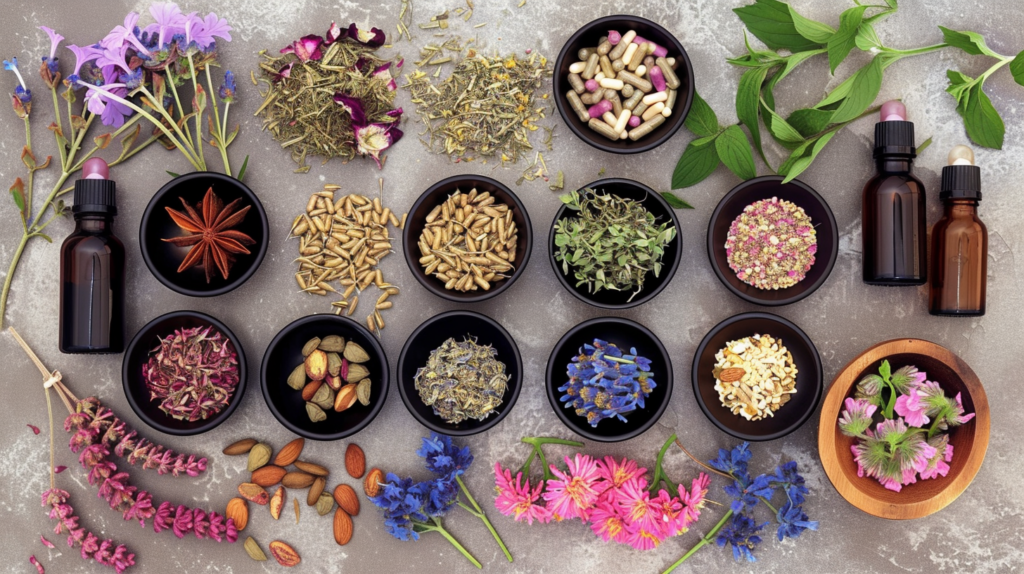
Using the Right Dosage
When it comes to herbal medicines, dosage is key. Unlike pharmaceuticals, herbal remedies can vary significantly in potency. It’s crucial to follow recommended dosages found in reliable sources, be it a study, a practitioner’s advice, or guidelines set by institutions like the National Institutes of Health. Overuse of herbs can lead to unintended side effects. For instance, too much of the herb St. John’s wort, known for its mood-enhancing properties, can interfere with medications and lead to sensitivity to sunlight.
Potential Allergic Reactions
Even though herbal medicines are natural, they can still cause allergic reactions in some people. Symptoms like itching, swelling, or shortness of breath should not be ignored. An excellent example is chamomile, which belongs to the same family as ragweed, a common allergen. So, if you’re allergic to ragweed, there’s a high chance you might react to chamomile too!
Consulting with Healthcare Professionals
Before diving into herbal supplements, consulting with a healthcare professional is always a good idea. They can provide personalized advice based on your medical history and current medications, ensuring no harmful interactions occur. This step is especially important for those undergoing treatments for serious conditions like cancer or cardiovascular diseases, as herbal remedies might interfere with conventional drugs.
How to Incorporate Herbal Medicine into Your Life
Growing Your Own Herbs
There’s something deeply satisfying about growing your own herbs. It connects you to the earth and allows you to control the quality of your herbal products. Plants like basil, mint, and rosemary are relatively easy to cultivate and can provide a constant supply of fresh ingredients for your homemade remedies. Trust me, there’s nothing like a cup of peppermint tea from leaves you’ve grown yourself!
| Herb | Growing Tips |
|---|---|
| Basil | Prefers sunny spots and needs regular watering. |
| Mint | Thrives in partial shade; can become invasive, so plant in pots if needed. |
| Rosemary | Requires well-drained soil and plenty of sunlight. |
Making Herbal Remedies at Home
Once your garden is flourishing, the next step is to start making your own herbal remedies. From teas and tinctures to salves and syrups, the possibilities are endless. For newbies, herbal teas are a great starting point. Simply steep your chosen herbs in hot water, strain, and enjoy. You can even make tinctures using alcohol or glycerin to extract the medicinal properties of the plants.
Buying Herbal Products
If growing a garden isn’t feasible, many excellent herbal supplements and products are available for purchase. Always opt for high-quality, reputable brands to ensure you’re getting remedies that are both safe and effective. Look for products that are certified organic and non-GMO. Reading reviews and checking if the products have been tested for contaminants like heavy metals can also be helpful.
Conclusion
Summary of Benefits
The world of herbal medicine offers numerous advantages, from natural healing to fewer side effects and cost savings. Herbs work holistically to support your body’s innate processes, making them a fantastic option for those looking to enhance their wellness naturally.
Getting Started with Herbal Medicine
Ready to dive into the world of herbs? Start small. Perhaps grow your own chamomile for a calming tea or purchase a high-quality echinacea supplement to boost your immunity. The journey into herbal medicine is both rewarding and enlightening, providing a deeper connection to nature and personal health.
